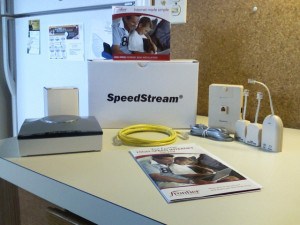Several weeks ago, I documented Frontier Communications as a potential competitor customers in the Rochester area could choose for cap-free DSL service. Much of that information is in our “Alternatives” section. Unfortunately, some of that information is wrong, not because I got it wrong, but because the customer service representative got it wrong when they shared it with me.
 I now have had the opportunity to sit down and document the correct pricing information, as well as my DSL experience thus far. This is also an important article for another reason — it helps explain why Frontier is never going to be a viable competitor for a lot of people in this community.
I now have had the opportunity to sit down and document the correct pricing information, as well as my DSL experience thus far. This is also an important article for another reason — it helps explain why Frontier is never going to be a viable competitor for a lot of people in this community.
It’s All in the Bundle
Frontier Communications, like Time Warner, believes in the “bundle.” They want to be your single provider for television, telephone, and broadband service. The incentive for taking the bundle is the greater discount you receive from a combined package. Take all three components, get the largest discount. Take just one and the discount is less.
Unfortunately, Frontier has a problem with their bundle. They cannot deliver a wired television package. They resell Echostar’s DISH satellite system instead. That automatically excludes some people who don’t have a good “look angle” to the proper spot in the sky to receive the satellite signal, do not want a dish on or about their house, or live in an apartment building that makes satellite equipment untenable.
Frontier’s broadband service uses ADSL (digital subscriber line) technology. It transmits data on frequencies above the frequency range of the human voice, which lets you use the same phone line for both data and regular phone calls. The telephone company gets to leverage their copper wire infrastructure to deliver Internet service to customers without having to rewire entire communities.
Unfortunately, DSL cannot provide as consistent a level of speed to customers as fiber or coaxial cable systems can. That’s because the further away you are from the telephone company “switch,” or “central office” which serves your exchange, the lower the signal level reaches your home. If you are within 5,000 feet of the central office, your speeds will likely achieve those close to what the company markets. If you are within 5,000-10,000 feet, you’ll probably end up with around half of what they promise in their ads. If you are over 10,000 feet, things start to drop off rapidly. At over 18,000 feet, at least with Frontier, you are basically out of luck. The phone company usually “locks” your speed at the rate which can best sustain itself without dropping out, in a setting on your modem.
For people who just use their connection for e-mail or web page browsing, they may not know the difference. They don’t often understand 10Mbps down/1Mbps up, much less realize their effective speed might be far less than that. But for anyone who uses higher bandwidth applications like video, downloading, and other types of streaming, the difference can be dramatic.
The Competitive Situation for Broadband in Rochester, N.Y.
Rochester divides the broadband market into two players: Time Warner, which has the largest percentage of broadband customers, and Frontier Communications, the local telephone company which has had a declining percentage of the market. Clearwire and wireless data services do not have a significant market share for consumer broadband.
Time Warner has been cleaning up in Rochester because their infrastructure provides a far more consistent product, at substantially higher speeds, than what Frontier can provide. The differences are dramatic for speeds, and consumers are not obligated with the cable provider into a term contract. There is no equipment rental fee, and taxes are lower on the cable broadband product.
Frontier DSL can be less expensive than Road Runner, as part of a discounted bundle package. Frontier routinely tries to market a bundle with a two year service commitment with a $300 cancellation fee. But if you are outside of the range for acceptable DSL service, Frontier DSL is not an option at all. If you are on the periphery of a central office switch, your service will be degraded, at best. For many who are concerned about speed and performance, DSL locally has not kept up.
My Personal Experience With Frontier
Things weren’t going well from the start. During my initial phone call to inquire about rates and packages for Frontier’s DSL service, confusion reigned on the part of the call center employee in DeLand, Florida. That’s because we were enrolled in a long-since-discontinued Frontier Choices plan, which allowed customers to choose which phone features they wanted on their line for one flat price. You just had to call and request them. We were told that DSL would be available to us for an additional $29.99 per month. We said yes. The call center representative tried to add the service, but actually ended up stripping all of the included phone features we’ve used (caller ID, call waiting, etc.) out of the Frontier Choices package and began charging full retail price for each one. Then, since the DSL service was not added properly, no proper work order was issued, no equipment was ever sent, but the billing sure started. I should have realized something wasn’t right when the representative kept saying we qualified for “free wee-fee.”
Two weeks after waiting for the self-install kit to arrive, I called to inquire and was promised that a second self-install kit would be mailed out by overnight express. That never arrived either. I finally drove down to the local Frontier store and picked one up myself because I grew weary of waiting. I installed it and… nothing. The service didn’t work at all.
Finally, over the weekend, a Frontier specialist was assigned to the case and promised to get a service call established and get things straightened out. It was then he discovered just how botched my account was. Our last month’s bill was around $50. This month, so far, it was $122.94 and counting. Oh good.
After a prolonged conversation, we got the right account plans configured (details and pricing below). Now all that was necessary was a service call to straighten out the horrendous speed I was getting after the service was activated. The modem was locked at 320kbps down/192kbps up because that was all the line could sustain. The representative in DeLand figured that with some creative technical work, we might achieve 6-7Mbps for downloads. That was still less than the marketed 10Mbps down service, but within tolerable limits considering my distance from the office.
The Frontier representative that just completed work here was friendly and exceptionally helpful. He diagnosed some problems with wiring, installed an external DSL filter outside the house, and ran a new wire to segregate the DSL signal from the telephone line. One of the irritating side effects of DSL is that you can hear the subtle wooshing of the data stream in the background of all of your phone calls, even with the filters installed. Phone cable traditionally has two pairs of wiring. The Frontier technician left one pair for the basic phone line, and ran DSL down the other.
Then the moment of truth arrived. What kind of speeds was my telephone line capable of providing me from Frontier’s DSL service? After some testing, a very disappointing result: just over 3Mbps download speed could be provided at my location. That is as good as it is going to get. The technician himself complained that the call center representatives are wildly optimistic about speeds in the metro Rochester area. Local technicians that know the area’s network of wiring are far better at predicting speed levels, and my technician was just a shy under what he thought my line could sustain.
Ultimately, that means a service that is 70% less than what was marketed, and I am not even close to being at the far end of acceptable DSL in Rochester – 18,000 feet maximum.
I am going to take a few days to contemplate all of this, but my initial leaning is to dump Frontier DSL and declare it a non-viable option, at least in my circumstance. No company should expect a customer to be satisfied with a product or service that delivers only about 30% of what it promises, all at regular pricing. I may lean on them to see if there is some alternative engineering solution to improve speeds, but if that doesn’t happen, I will likely exit Frontier’s data service before the 30 day satisfaction window closes.
Is Frontier Truly a Competitive Alternative for Broadband?
This is a very important question, because Frontier argues they are and Time Warner has never suggested they are the only provider in the area. But it comes down to how you define “broadband.” For suburban customers like myself, 3Mbps is honestly not an acceptable amount of speed for broadband service, especially at a price not too lower than what Time Warner charges for Road Runner. Customers are stuck, because until they install the service, they won’t know what speeds they will ultimately achieve. Sure it may work for light bandwidth uses, but it’s hardly a good value when the competition offers considerably more (for now at least).
This represents more evidence of the threat of the Broadband Backwater, where the dominant player exercises market power by limiting access, charging enormous overlimit fees, or refusing to upgrade because equal competition does not exist. I am a textbook case of a customer that, based on my requirements, will have just one company to choose: Time Warner. DSL cannot meet my needs with 3Mbps service, except perhaps as a backup. If Time Warner caps usage, then my only true option would be to pay up to triple the price I am charged today for exactly the same service I get today.
The choice in Rochester would be clear: either take the capped and tiered broadband plan from Time Warner and ration your use of it, or go with Frontier for a potentially dramatically slower connection, with no cap for now. And Frontier cannot match my current Road Runner Turbo service (15Mbps/1Mbps) at all. It’s a choice consumers in this area should not be forced to make, and would not have to if more advanced services like Verizon FiOS were available here.
In Buffalo and Syracuse, both adjacent to Rochester, your choices include faster Road Runner service at the same price paid in Rochester, plus Verizon FiOS, with speeds as high as 50Mbps/20Mbps, which aren’t available in Rochester period. Add draconian usage caps in the Flower City, and you might as well move. Your broadband service sure won’t.


 Subscribe
Subscribe




